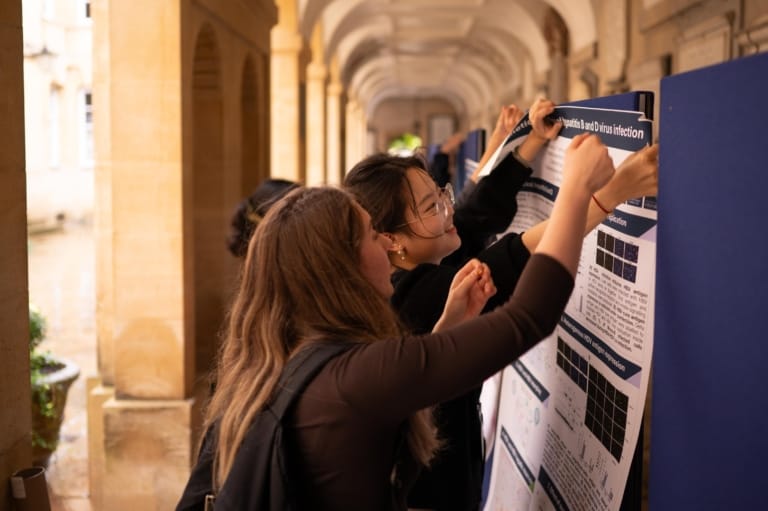We received a large number of high quality applications this year, and as a result we have decided to award the Lister Prize to eight outstanding scientists. We are delighted to welcome these remarkable researchers to the Lister community and we look forward to supporting their work in the years to come. Read on to learn more about each of our new Lister Fellows and their research interests.
Dr Johnathan Cooper-Knock
University of Sheffield

Johnathan is a neurologist and geneticist focused on the discovery of new genetic causes of motor neuron disease (MND, also called ALS), a rapidly progressive and untreatable neurodegenerative disease. In recent years new gene therapy has become available for the treatment of ALS, but is currently limited to the 1-2% of ALS patients who carry a pathogenic mutation in the SOD1 gene. Using single-cell resolution profiling of patient-derived material and large genotyping datasets, Johnathan aims to discover new genetic drivers of ALS which can unlock new understanding and ultimately new treatments.
“The Lister Prize will accelerate my research into the genetics of MND; through direct support, and also through the opportunity to interact and collaborate with the wider Lister family of exceptional scientists. The flexible funding will allow me to fine-tune the development of my multidisciplinary lab to leverage cutting-edge tools and technologies.”
Read more about Johnathan’s research
Find Johnathan Cooper-Knock on LinkedIn
Follow Johnathan on X (Twitter)
Dr Yuval Elani
Imperial College London

Yuval’s research focuses on engineering non-living analogues of living cells, constructed from the bottom up from biomolecular building blocks. These synthetic cells can now be programmed to exhibit life-like behaviours such as motility, energy generation, decision-making, metabolism, communication, and bioproduction. This is enabled by state-of-the-art microfluidic and robotic pipelines, along with engineered cell membranes combined with synthetic biology tools. Through this Prize, he and his team aim to pivot their research towards biomedical applications – developing synthetic cell therapies that address bottlenecks limiting the potential of living cell therapies (such as bacterial and CAR-T).
“This unique Prize allows me to launch a new, biomedically focused research line – building on our fundamental work to develop what we hope will become a new therapeutic modality. This requires a leap of faith that traditional funders are often reluctant to take, and I’m incredibly grateful to the Lister Institute for supporting me on this journey.”
Read more about Yuval’s research
Dr Vilaiwan Fernandes
UCL

The brain’s ability to regenerate neurons is limited, prompting efforts to create new neurons through direct reprogramming of other cell types. A major barrier is the inefficient acquisition of core neuronal features shared by all neurons. Using Drosophila, where these core neuronal traits can be studied independently of neuron subtype, Vilaiwan’s team has identified key regulators of early neuronal identity. The team will define these regulators’ roles in development and test their ability to improve reprogramming outcomes, guiding more effective strategies for neuron replacement.
“Winning the Lister Prize is a tremendous honour that gives me the freedom to pursue an entirely new direction in my research. It will enable my lab to apply developmental neurobiology insights to the challenge of direct neuronal reprogramming. Beyond this critical support for high-risk, high-reward science, I’m especially grateful to join a community of creative researchers tackling fundamental questions in biology.”
Read more about Vilaiwan’s research
Dr Chris Hill
University of York

Positive-sense RNA viruses are responsible for billions of human infections every year. Following cell entry, a crucial molecular event is translation of the RNA genome to produce viral proteins. To do this, viruses must capture and reprogram host ribosomes, employing unusual mechanisms such as IRES-mediated initiation and programmed ribosomal frameshifting. Research in Chris’ group focuses on better understanding these processes, both in vitro and in infected cells. His team combines cutting-edge structural, biophysical and imaging techniques to gain an integrated understanding of how structured RNA elements control viral protein synthesis.
“Winning the Lister Prize will have a huge impact on my research programme. The flexible, long-term funding will enable me to invest in an entirely new area, building workflows, collaborations and expertise for in situ structural biology. I am delighted to join the vibrant and exciting community of Lister Fellows, and I look forward to engaging with the Summer Studentship scheme as a way of supporting ambitious and talented undergraduate scientists.”
Read more about Chris’ research
Dr Kelly Nguyen
MRC Laboratory of Molecular Biology

Kelly’s group investigates telomeres – the protective caps at the ends of eukaryotic chromosomes that safeguard our genetic material. Because telomere integrity is essential for genome stability, its disruption is closely associated with cancer and aging. Using a multidisciplinary approach that combines biochemistry, structural biology, and functional assays, her team aims to uncover the cellular mechanisms governing telomere maintenance and how their failure contributes to human disease. These studies have significant implications for developing telomere-targeted therapies.
“It is a tremendous honour for me and my group to receive the Lister Prize this year. This award will enable us to explore new research directions and push the frontiers of telomere biology and beyond. I’m also thrilled by the opportunity to connect with a diverse community of scientists, which I believe will spark exciting collaborations and novel lines of inquiry in our lab.”
Read more about Kelly’s research
Dr Fränze Progatzky
University of Oxford

Fränze studies how the peripheral nervous system, through glial cells, regulates immune responses and tissue repair in barrier organs such as the lungs, gut, and skin. Once thought to be passive bystanders, glial cells are now emerging as key regulators of barrier tissue homeostasis. Understanding how they contribute to disease processes is crucial to advancing our knowledge and treatment of inflammatory disorders affecting these organs, such as inflammatory bowel disease, asthma, and atopic dermatitis.
“I am delighted and honoured to receive the Lister Prize. This award will significantly accelerate the trajectory of my newly established lab by enabling us to forge an exciting new research avenue on the tissue-regulatory roles of peripheral glial cells. The flexible nature of the Prize allows me to build data science capacity within my lab, strengthen the human relevance of our research, and support training the next generation of scientists.”
Read more about Fränze’s research
Dr Stephen John Sammut
The Institute of Cancer Research

Stephen’s research investigates the dynamic interplay between cancer cells and the immune system, focusing on how their co-evolution shapes response to therapy and survival. His laboratory applies high-resolution single-cell and spatial phenotyping technologies, integrated with machine learning, to reconstruct the molecular and cellular ecosystems of breast tumours. By charting the evolutionary strategies tumours use to evade immune recognition, he aims to uncover mechanisms of immune failure and lay the foundation for precision immunotherapies to restore immune function in breast cancer.
“Winning the Lister Prize is a profound honour that recognises the potential impact of my research programme. The Prize’s flexible funding will allow me to pursue ambitious high-risk projects that traditional funding streams might not support. Joining the Lister community will offer me an invaluable opportunity for collaboration and mentorship that will strengthen the scientific rigor of my work.”
Read more about Stephen’s research
Dr James Thaventhiran
University of Cambridge

James is an academic clinical immunologist specialising in immunodeficiency. He leads a research group that uses vaccine responses to investigate immune function, closely aligning with his clinical practice. The team has defined novel genetic immunodeficiencies (SOCS1, PTPN2, IL6R), shaping treatment decisions including experimental therapies and bone marrow transplantation. He brought together collaborators in public health and metabolism to form the SCORPIO collaboration, which revealed impaired COVID-19 vaccine durability in obesity. His lab empowers researchers to combine preclinical models and human genetics to uncover immune pathway functions in health and disease.
“Modern oligonucleotide therapies offer a radical new frontier for treating rare diseases. The Lister Prize enables my group to build on pandemic-era experience to refine modified mRNA therapies, harnessing their personalised potential to develop next-generation treatments.”



